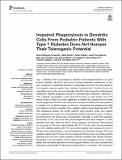Por favor, use este identificador para citar o enlazar a este item:
http://hdl.handle.net/10261/219864COMPARTIR / EXPORTAR:
 SHARE SHARE
 CORE
BASE CORE
BASE
|
|
| Visualizar otros formatos: MARC | Dublin Core | RDF | ORE | MODS | METS | DIDL | DATACITE | |

| Título: | Impaired phagocytosis in dendritic cells from pediatric patients with type 1 diabetes does not hamper their tolerogenic potential |
Autor: | Rodríguez-Fernández, Silvia; Murillo, Marta; Villalba, Adrian; Perna-Barrull, David; Cano-Sarabia, Mary CSIC ORCID; Gómez-Muñoz, Laia; Aguilera, Eva; Maspoch, Daniel CSIC ORCID ; Vazquez, Federico; Bel, Joan; Vives-Pi, Marta | Fecha de publicación: | 2019 | Editor: | Frontiers Media | Citación: | Frontiers in Immunology 10: 2811 (2019) | Resumen: | Type 1 diabetes (T1D) is prompted by defective immunological tolerance, an event in which dendritic cells (DCs) are crucial as immune response orchestrators. In fact, they contribute to maintaining tolerance to self-antigens, but they can also prompt an immunogenic response against them, leading to autoimmunity. Countless factors can potentially impact on the proper functionality of the DCs, which range from altered subset distribution, impaired phagocytic function to abnormal gene expression. Moreover, in T1D, metabolic dysregulation could impair DC functions as well. Indeed, since T1D clinical course is likely to be more aggressive in children and adolescents and entails severe dysglycemia, the aim of this study was to analyze circulating DCs subpopulations in pediatric T1D at different stages, as well as to characterize their phagocytosis ability and tolerance induction potential. Thus, pediatric patients newly diagnosed with T1D, with established disease and control subjects were recruited. Firstly, DCs subsets from peripheral blood were found quantitatively altered during the first year of disease, but recovered in the second year of progression. Secondly, to study the tolerogenic functionality of DCs, liposomes with phosphatidylserine (PS) were designed to mimic apoptotic beta cells, which are able to induce tolerance, as previously demonstrated by our group in DCs from adult patients with T1D. In this study, monocyte-derived DCs from pediatric patients with T1D and control subjects were assessed in terms of PS-liposomes capture kinetics, and transcriptional and phenotypic changes. DCs from pediatric patients with T1D were found to phagocyte PS-liposomes more slowly and less efficiently than DCs from control subjects, inversely correlating with disease evolution. Nonetheless, the transcription of PS receptors and immunoregulatory genes, cytokine profile, and membrane expression of immunological markers in DCs was consistent with tolerogenic potential after PS-liposomes phagocytosis. In conclusion, T1D progression in childhood entails altered peripheral blood DCs subsets, as well as impaired DCs phagocytosis, although tolerance induction could still function optimally. Therefore, this study provides useful data for patient follow-up and stratification in immunotherapy clinical trials. | Versión del editor: | https://doi.org/10.3389/fimmu.2019.02811 | URI: | http://hdl.handle.net/10261/219864 | DOI: | 10.3389/fimmu.2019.02811 | E-ISSN: | 1664-3224 |
| Aparece en las colecciones: | (CIN2) Artículos |
Ficheros en este ítem:
| Fichero | Descripción | Tamaño | Formato | |
|---|---|---|---|---|
| imparpotenti.pdf | 1,58 MB | Adobe PDF |  Visualizar/Abrir |
CORE Recommender
PubMed Central
Citations
7
checked on 13-mar-2024
SCOPUSTM
Citations
8
checked on 08-abr-2024
WEB OF SCIENCETM
Citations
9
checked on 28-feb-2024
Page view(s)
114
checked on 16-abr-2024
Download(s)
202
checked on 16-abr-2024

